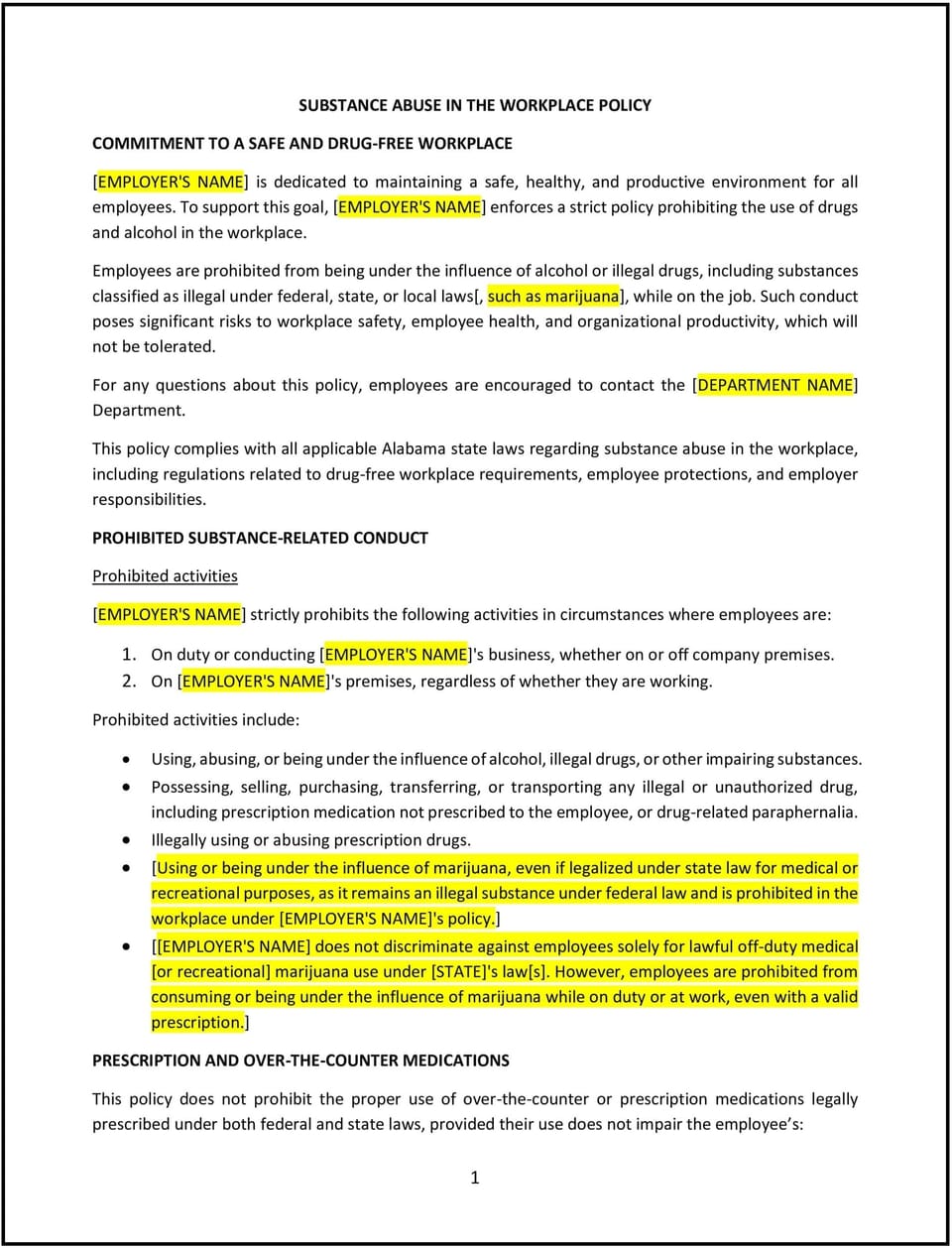Substance abuse in the workplace policy (Alabama): Free template

Substance abuse in the workplace policy (Alabama)
A substance abuse in the workplace policy establishes guidelines to ensure a safe, healthy, and productive work environment by addressing issues related to the use of drugs and alcohol. For SMBs in Alabama, this policy aligns with state and federal regulations, promoting employee well-being and minimizing risks associated with substance misuse.
This policy outlines prohibited behaviors, testing procedures, support resources, and disciplinary actions, creating a structured framework for handling substance abuse concerns.
How to use this substance abuse in the workplace policy (Alabama)
- Define substance abuse: Clearly state what constitutes substance abuse, including the use, possession, or distribution of illegal drugs and the misuse of alcohol or prescription medications.
- Prohibit workplace substance use: Specify that employees must not report to work under the influence of drugs or alcohol or engage in substance use on company premises.
- Include testing protocols: Detail when and how drug and alcohol testing may be conducted, such as pre-employment, random, or post-incident testing, in compliance with Alabama laws.
- Offer support resources: Highlight available resources, such as employee assistance programs (EAPs), for employees seeking help with substance-related issues.
- Outline disciplinary measures: Explain the consequences for policy violations, ranging from warnings to termination, based on the severity of the misconduct.
Benefits of using a substance abuse in the workplace policy (Alabama)
A substance abuse policy promotes workplace safety and productivity while supporting employees. Here’s how it helps:
- Enhances safety: Reduces risks of accidents or injuries caused by impairment on the job.
- Protects employee health: Encourages employees to seek help for substance-related issues before they escalate.
- Ensures compliance: Aligns with Alabama and federal laws, such as the Drug-Free Workplace Act, to minimize legal risks.
- Maintains productivity: Addresses substance abuse issues that can negatively impact performance and team dynamics.
- Provides clarity: Sets clear expectations and procedures for handling substance-related concerns consistently.
Tips for implementing a substance abuse in the workplace policy (Alabama)
- Communicate the policy: Share the policy with all employees during onboarding and through regular updates to ensure understanding.
- Provide training: Offer training for managers and HR staff on recognizing signs of substance abuse and addressing concerns effectively.
- Protect confidentiality: Handle all substance-related issues and testing results discreetly to respect employee privacy.
- Encourage voluntary disclosure: Create a supportive environment where employees feel comfortable seeking help for substance-related issues without fear of retaliation.
- Monitor compliance: Regularly review testing protocols, resources, and disciplinary actions to ensure they align with legal standards and company goals.
Q: What substances should this policy prohibit?
A: The policy should explicitly prohibit illegal drugs, alcohol misuse, and unauthorized use or abuse of prescription medications to maintain workplace safety and compliance.
Q: Should SMBs conduct drug or alcohol testing?
A: Yes, testing can be conducted during pre-employment screening, randomly, post-incident, or when reasonable suspicion arises, as permitted by Alabama law.
Q: How should test results be handled to ensure confidentiality?
A: Test results must remain confidential, accessible only to authorized personnel responsible for addressing the issue or making employment decisions.
Q: Can SMBs encourage employees to seek help for substance-related issues?
A: Yes, providing access to resources like employee assistance programs (EAPs) can help employees address substance-related issues proactively, improving overall workplace health.
Q: What actions should be taken for policy violations?
A: Consequences should be clearly outlined, ranging from warnings and suspensions to mandatory rehabilitation or termination, depending on the severity of the violation.
Q: Does this policy cover substance use outside of work?
A: Yes, off-duty substance use that impacts workplace performance, safety, or adherence to company policies should be addressed under the policy to protect business operations.
This article contains general legal information and does not contain legal advice. Cobrief is not a law firm or a substitute for an attorney or law firm. The law is complex and changes often. For legal advice, please ask a lawyer.


